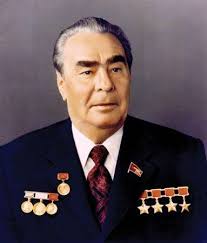
Leonid Brezhnev: Democratic role model?
Cas Mudde, an associate professor of public and international affairs at the University of Georgia, had an interesting news analysis about Russiagate recently at the otherwise execrable Guardian website. It managed to make two all-important points in less than 800 words.
One concerned the nature of the investigation. Rather than an objective, unbiased inquiry into foreign meddling, it argues that Russiagate is nothing less than an effort at regime change. Since Special Prosecutor Robert Mueller’s much-ballyhooed Feb. 16 indictment of thirteen Russian individuals and three Russian corporations, Mudde wrote, “social and traditional media have exploded with speculations about the next step, because, in the end, the only question everyone really seems to care about is whether Donald Trump was involved – and can therefore be impeached for treason. Democratic party leaders once again reassured their followers that this was the next logical step in the inevitable downfall of Trump.”
The purpose of Russiagate is thus not to get at the truth, but to toss out a legally elected US president. This makes it no different from the US-backed putsch against Ukrainian President Viktor Yanukovych in February 2014. Mudde’s other point, however, is that, unlike the Ukraine, the dump-Trump movement is going nowhere because it lacks the requisite political support. To be sure, 53 percent of Americans said in a recent poll that exposing Russian meddling should be a top or at least an important priority. But as impressive as that may seem, Mudde points out that it is substantially less than the 75 percent who assign the same importance to fixing healthcare, the 74 percent who believe that infrastructure investment is a must, the 65 percent who think that the financial system needs straightening out, and so on. Democrats are expending vast energy on an issue that voters regard as second-rate.
Mudde clearly thinks that Dems should get their priorities straight and concentrate on the things that count, a belief that this blog does not regard as quite so self-evident. So let’s re-examine these two points from an anti-Democratic, plague-on-both-your-houses viewpoint and see where they lead.
First, regime change. Hillary Clinton could have blamed any number of things for her 2016 loss. Since she carried the popular vote by nearly three million, she could have attacked the Electoral College as an eighteenth-century relic that should have been fixed ages ago. She could have attacked FBI Director James Comey for re-opening the investigation into her misplaced emails just two weeks prior to the vote. She could even have blamed herself for not campaigning in Wisconsin, Michigan, Pennsylvania, the three states that narrowly put her opponent over the edge. But instead she blamed Russia. As Jonathan Allen and Amie Parnes put it in their bestseller Shattered: Inside Hillary Clinton’s Doomed Campaign:
“That strategy had been set within twenty-four hours of her concession speech. [Campaign manager Robby] Mook and [campaign chairman John] Podesta assembled her communications team at the Brooklyn headquarters to engineer the case that the election wasn’t entirely on the up-and-up. For a couple of hours, with Shake Shack containers littering the room, they went over the script they would pitch to the press and the public. Already, Russian hacking was the centerpiece of the argument” (p. 396).
But why Russia? The answer is that for a divided and dysfunctional party, there was no other way out. Russia is America’s chief competitor on the international scene; hence, an anti-Kremlin campaign was a way of overcoming the party’s divisions by projecting them onto a foreign rival. It was a means of sidestepping the issues that have split the Dems down the middle, starting with HRC’s 40-year record of support for US imperial adventures from the Nicaraguan Contras on.
So Democrats decided to run with it. Obviously, they had no hope of actually convicting Trump of treason. But they counted on a steady drip, drip, drip of evidence to either drive him out of office or cripple him until the midterm elections, at which point they would move in for the kill.
But there was a problem. Not only is there zero evidence of treason – which the Constitution defines as nothing less than “levying war” against the United States (Art. III, sec. 3) – but there is no sign of even lesser forms of collusion. As even the Christopher Steele dossier admits, Trump’s efforts to do business in Russia were unsuccessful while there is no evidence of Russians using bank loans, sex tapes, or any other items either to cultivate him or compel him to do their bidding. To the contrary, his admiration for Putin as a fellow tough-talking nationalist seems to be entirely unforced. He looks up to him as a Russia-firster who ran circles around Obama, Clinton, and John Kerry in the Ukraine and Middle East and therefore as someone worthy of emulation.
This is why months of screaming headlines have come to naught — because there’s no “there” there. The latest indictments are a case in point. Not only do they describe an operation that was even more inept and amateurish than skeptics had imagined, but they notably fall short of establishing a connection with either the Kremlin or the Trump campaign.
After nine months of labor, Mueller has brought forth a mouse. So Mudde is right: what started out as a no-brainer has turned into an all-but-certain loser. As for his point about the widening gap between the Democratic elite and the broader electorate, the situation is even direr than he imagines. It calls to mind what a smart French sociologist named Emmanuel Todd said about the Soviets back in the 1970s:
“Certain ruling groups, because of the way they are organized, seem to develop a mentality which is irredeemably stupid. They are totally unconscious of the nature of social relations of which they form a part. Bureaucratic organizations strongly encourage indifference to the fate of the masses, because they depersonalize the relations of economic exploitation. … Structurally induced stupidity is generally manifested in the odious behavior of the privileged toward the exploited, during a prerevolutionary period. Afterwards, one speaks of the blindness of the class which was overthrown.” (The Final Fall: An Essay on the Decomposition of the Soviet Sphere [New York: Karz, 1979], 130.]
Todd was not just slinging insults. The Soviet bureaucracy was exhausted by the Brezhnev years. Socialism had fallen by the wayside, and, as a consequence, the “apparatus” had no idea what to do with itself, what its historical mission might be, or even why it existed at all. It was indifferent to the fate of the masses because it was socially and ideologically cut off and therefore incapable of attending to anyone’s concerns other than its own. Stupidity did not flow from the individual, but from the system as a whole – hence, it was “structurally induced.”
How different are today’s Democrats? America’s 230-year-old political system is also exhausted. The House is distorted by gerrymandering while the Senate is the most malapportioned major legislative body in the putative democratic world. (Thanks to the principle of equal state representation, the 53 percent of the US that lives in the ten most populous states has the same voting power as the three percent that lives in the ten least,) Two of the last five presidential elections have been stolen thanks to the Electoral College while the judiciary is firmly in the hands of conservatives dedicated to the principle of original intent. (Where Evelyn Waugh once complained that Tories always promise to turn back the clock but never do, the US Supreme Court is proving him wrong.) Yet even though a structural overhaul is long overdue, the problem is unfixable thanks to an amending clause that allows thirteen states representing as little as 4.4 percent of the country to veto any repair, no matter how minor.
Nothing can be done. As result, today’s Democrats stumble through the motions not unlike the Brezhnevites of the 1970s. They pretend to fight Trump while the base pretends to care. Given that the integuments that once held the system together have long since frayed, the two layers are heading off in opposite directions. While Hillary Clinton’s summers in a $29-million house in the Hamptons next door to Harvey Weinstein and her daughter rakes in a hefty salary heading up the family foundation, the sons and daughters of those who voted for her are sent off to fight in meaningless wars in the Middle East.
No one cares because “structurally induced” stupidity doesn’t permit them to care. Instead, it locks them in a system of induced atomization in which the only “realistic” option is to look out for number one. Trump is stronger than ever, the bogus “resistance” is collapsing, while Democratic prospects for the midterm elections are looking none too bright. In other words, events are following their expected course.


